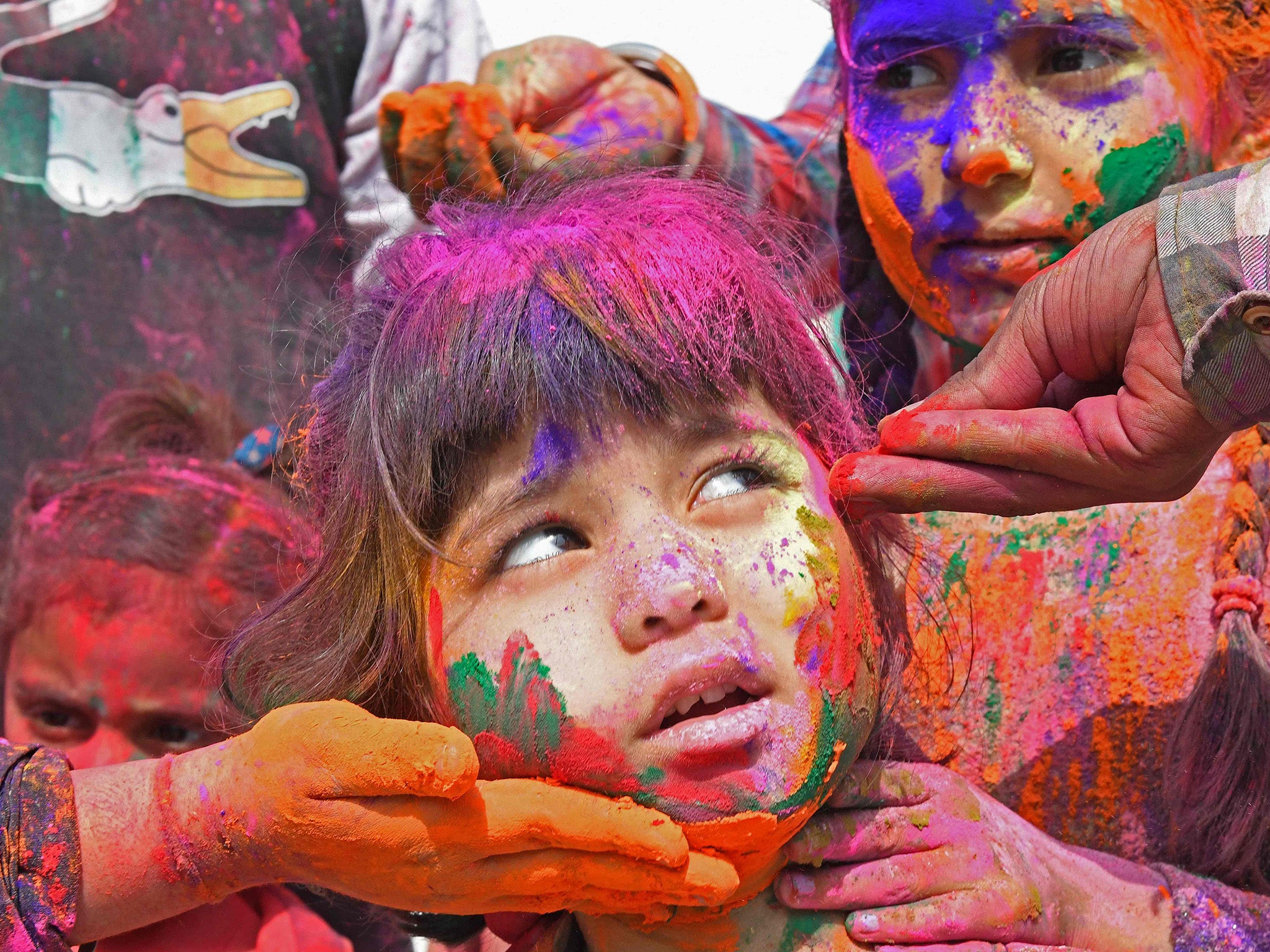How Indians are marking the Holi festival amid a second Covid wave
Pandemic restrictions might stop grand celebrations but they won’t kill our spirits, a family tells Peony Hirwani


Holi is one of the most significant and fun-loving Hindu festivals celebrated with great gusto each year in India. On this national holiday, the country lets loose – loved ones smear each other with colours, toss water balloons and dance to a soundtrack of Bollywood beats, while enjoying festive food and bhang – an edible preparation of cannabis.
If Holi was celebrated in India under the shadow of the emerging pandemic last year, this year a growing second wave is underway as new daily cases cross the 50,000 mark.
Large public gatherings were officially prohibited as a result, forcing families to get creative with smaller and more personalised ways to mark this auspicious festival.
Abhilasha Daga, who belongs to a traditional Marwari family from Mumbai, said: “This year, I’m hosting a very close-knit Holi celebration with my immediate family where we’ve decorated our home terrace, as we have a young child who loves to play with colours, water, and balloons.
“For as long as three years, the youngster has been having an energising and terrific Holi celebration. Therefore, to not disappoint her, we’ve concocted a personalised smaller version of the massive 100-people grand party celebration.”
Keeping in mind the Covid-19 infection rate, Daga’s family had chosen, “to not call for anything from outside this year”. They cooked their own authentic home-made Marwari meals and desserts from scratch, with specialities such as moong chawal and lassi, canopies, wheat flour spaghetti and mango rabdi.
Daga also had plans to conduct a small Holika ritual [the prayer of fire] on Sunday night before the main festival day on Monday, though that arrangement was cancelled due to police raids in the city.
Read more:
- Follow Covid news live: Latest lockdown updates
- Von der Leyen says AstraZeneca must ‘catch up’ on vaccines to EU
- Lockdown roadmap dates: Which rules change on 29 March?
- Extreme lockdown laws extended for a further six months despite major Tory revolt
- Pfizer Covid vaccine produces ‘robust’ antibody response after first dose, new study shows
Another individual whose Holi will be very different this year is the acclaimed Indian-British musician and instrumentalist Baluji Shrivastav, who has a visual impairment.
Shrivastav said: “Typically, if there wasn’t coronavirus, I would’ve gone to visit my Indian companions, or played out a live Holi concert in a public gathering. I would’ve additionally preferred to visit India to celebrate the Lathmar [stick] Holi.
“Talking as a blind person, the festival of colours never made sense to me for obvious reasons, however, I have discovered that bliss of colours in my music when I play different ragas [melodic compositions].”
This year, to mark Holi, with the assistance of his wife, Shrivastav released a new music album called Voice of Flowers: Spring Ragas from India and facilitated a Facebook live session to sing together and talk about all things related to the festival.
“Holika Dahan [the Holi fire ritual] is personally very important to me due to historic factors, and I do miss praising it the conventional way,” said Shrivastav.
No Holi celebration in India is complete without traditional food, and Masterchef finalist Dinesh Patel had special plans.
He said: “I’ve been stuck in the UK for as long as a year, and we’re totally missing Holi because of lockdown limitations in the UK. For me, festivals mainly centre around food because that’s the way we show affection between us as a family.”
This year, the chef lined up traditional recipes of dishes such as malpua and rabdi [pancakes and sweet condensed milk], surti sev khamani [a crispy snack], shahi tukda [a bread-based dessert] and methi aloo and puri [fenugreek potatoes with bread], to share with his loved ones.
He said: “I will be taking these items and dropping them at the doorsteps of my family, and vice versa. We get food also.
“I will be making a thal [platter] for prasad [food offering to god] followed by a little pooja [prayer] service at home and breaking of the Holika Dayan fast, before feasting.
“Visiting our small Indian community in Bolton, going to the temple, congregating and celebrating together in person is something I generally used to anticipate. We have lost that sense of togetherness this year.”
Wherever they are in the world and whatever challenges they face from the pandemic, one thing that unites Indians during the Holi celebration in the feeling of excitement, welcome and lovingness that is inseparable from the spring festival of colour. Pandemic or not, people are learning to adapt to make sure that doesn’t change.
Join our commenting forum
Join thought-provoking conversations, follow other Independent readers and see their replies
Comments